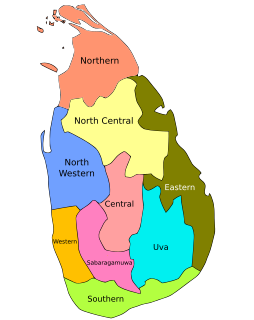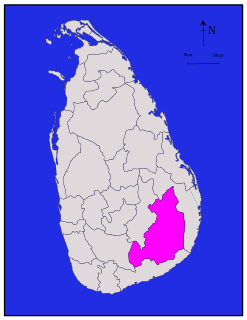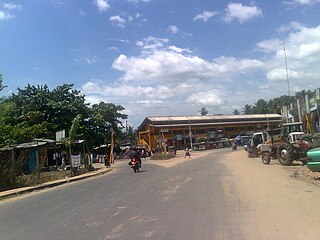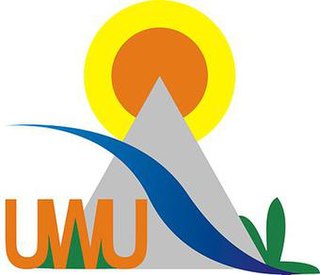
In Sri Lanka, provinces are the first level administrative division. They were first established by the British rulers of Ceylon in 1833. Over the next century most of the administrative functions were transferred to the districts, the second level administrative division. By the middle of the 20th century the provinces had become merely ceremonial. This changed in 1987 when, following several decades of increasing demand for a decentralization, the 13th Amendment to the 1978 Constitution of Sri Lanka established provincial councils. Currently there are nine provinces.

Uva Province is Sri Lanka's second least populated province, with 1,259,880 people, created in 1896. It consists of two districts: Badulla and Moneragala. The provincial capital is Badulla. Uva is bordered by Eastern, Southern, Sabaragamuwa and Central provinces. Its major tourist attractions are Dunhinda falls, Diyaluma Falls, Rawana Falls, the Yala National Park and Gal Oya National Park. The Gal Oya hills and the Central mountains are the main uplands, while the Mahaweli and Menik rivers and the huge Senanayake Samudraya and Maduru Oya Reservoirs are the major waterways.

Uwa Wellassa The Great Liberation War of 1817–1818 ඌව වෙල්ලස්ස මහ විමුක්ති හටන , also known as the 1818 Uva–Wellassa uprising, or simply the Uva The Great Liberation War, was the third Kandyan War with the British, in what is now Sri Lanka. It took place in what is now Uva, which was then a province of the Kingdom of Kandy, against the British colonial government under Governor Robert Brownrigg, which had been controlling the formerly independent Udarata.

The University Grants Commission (UGC) is the body responsible for funding most of the State Universities in Sri Lanka, and operates within the frame work of the Universities Act No. 16 of 1978, itself established by the Cabinet Minister of Education & Higher Education at the time Dr. Nissanka Wijeyeratne in 1979. A public organisation, established under the Parliament Act No 16 of 1978. Location is at No 20, Ward Place Colombo 07.

Ceylon was the British Crown colony of present-day Sri Lanka between 1796 and 4 of February 1948. Initially the area it covered did not include the Kingdom of Kandy, which was a protectorate, but from 1817 to 1948 the British possessions included the whole island of Ceylon, now the nation of Sri Lanka.

Monaragala is a district in Uva Province of Sri Lanka. It is the second largest of the 25 districts in Sri Lanka, with an area of 5,636 km2 (2,176 sq mi).

Bibile is a town located in Monaragala District, Uva Province of Sri Lanka. Bibile's land is important to Sri Lankan agriculture. It was well known for oranges, though still oranges grown there the original variety 'Bibile Sweet is no longer in existence. Bibile was known as 'Sinhale' in Martin Wickremesinghe's novel "Gamperaliya".

The Mahâ Dissâvas was a Great Officer in the Amātya Mandalaya, or Sinhalese Council of State, in the Sinhalese Kingdoms of premodern Sri Lanka. Like many of the existing high offices at the time it had combined legislative and judicial powers and functioned primarily equivalent to that of a Provincial governor. The office of Dissava was retained under the successive European colonial powers, namely the Portuguese Empire, the Dutch East India Company and the British Empire. A Dissava was the governor a province known as a Disavanies. With his province, the Dissava held both executive and judicial authority.

Uva Wellassa University is a Sri Lankan national university. The university was established by government gazette effective 1 June 2005 in Badulla, Sri Lanka as the 14th national university of Sri Lanka. President Chandrika Kumaratunga established the university in 2007. The university was officially opened by Sri Lankan president Mahinda Rajapaksa on 5 August 2009. It is the first all-entrepreneurial university in Sri Lanka. It is designed to provide essential skills and broad general education for all students while providing the conceptual and methodological background and the training to obtain practical solutions for value addition to the national resources base of Sri Lanka.
Dr Chandra Embuldeniya was the inaugural Vice Chancellor (2004-2011) of Uva Wellassa University in Sri Lanka. Dr Embuldeniya was the first private sector CEO to become a vice chancellor of a national university.

Deshamanya Justice Pathmanathan Ramanathan was a leading Sri Lankan Tamil lawyer and judge. Known as Rama, he was a High Court judge, Court of Appeal judge, provincial governor, university chancellor and a judge of the Supreme Court of Sri Lanka.
The Bachelor of Science in Aquatic Resources and Technology is an undergraduate degree that prepares students to pursue careers in the public, private, or non-profit sector in areas such as marine science, fisheries science, aquaculture, aquatic resource technology, food science, management, biotechnology and hydrography. Post-baccalaureate training is available in aquatic resource management and related areas.

The Kandyan period covers the history of Sri Lanka from 1597–1815. After the fall of the Kingdom of Kotte, the Kandyan Kingdom was the last Independent monarchy of Sri Lanka. The Kingdom played a major role throughout the history of Sri Lanka. It was founded in 1476. The kingdom located in the central part of Sri Lanka managed to remain independent from both the Portuguese and Dutch rule who controlled coastal parts of Sri Lanka; however, it was colonised by the British in 1815.
Cnemaspis kohukumburai, or Kohukumbura's day gecko, is a species of diurnal gecko endemic to island of Sri Lanka.
Cnemaspis hitihamii, or Hitihami's day gecko, is a species of diurnal gecko endemic to island of Sri Lanka.
Cnemaspis butewai, or Butewes’ day gecko, is a species of diurnal gecko endemic to island of Sri Lanka.
Cnemaspis kivulegedarai, or Kivulegedaras’ day gecko, is a species of diurnal gecko endemic to island of Sri Lanka.
Professor Jayantha Lal Ratnasekera is the Vice Chancellor of the Uva Wellassa University of Sri Lanka.











